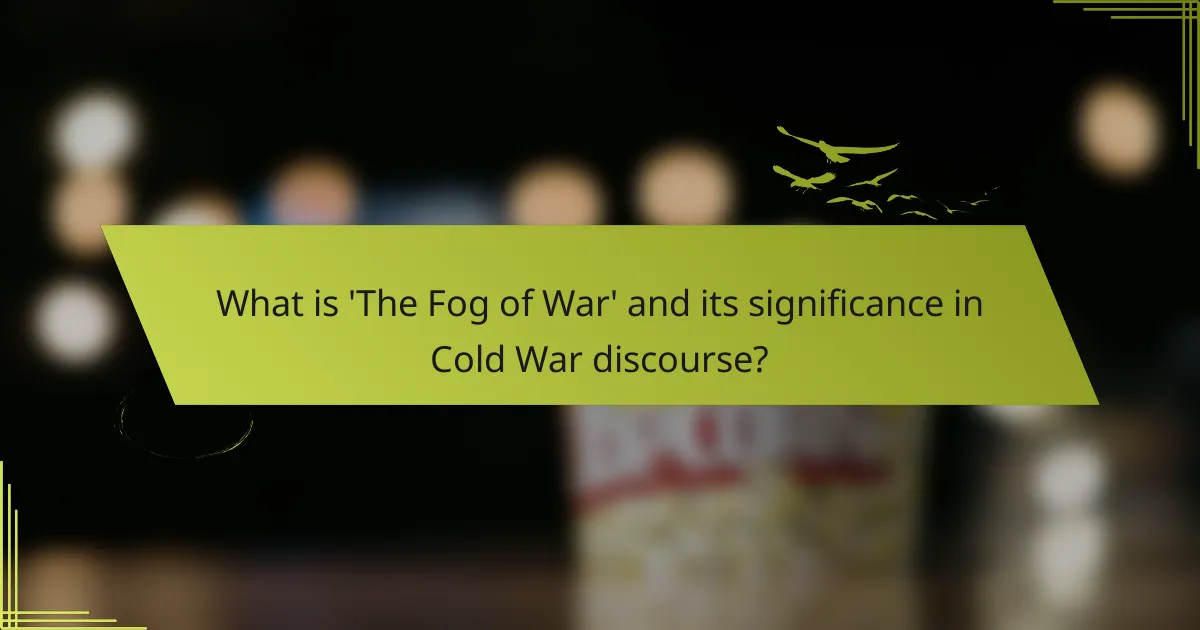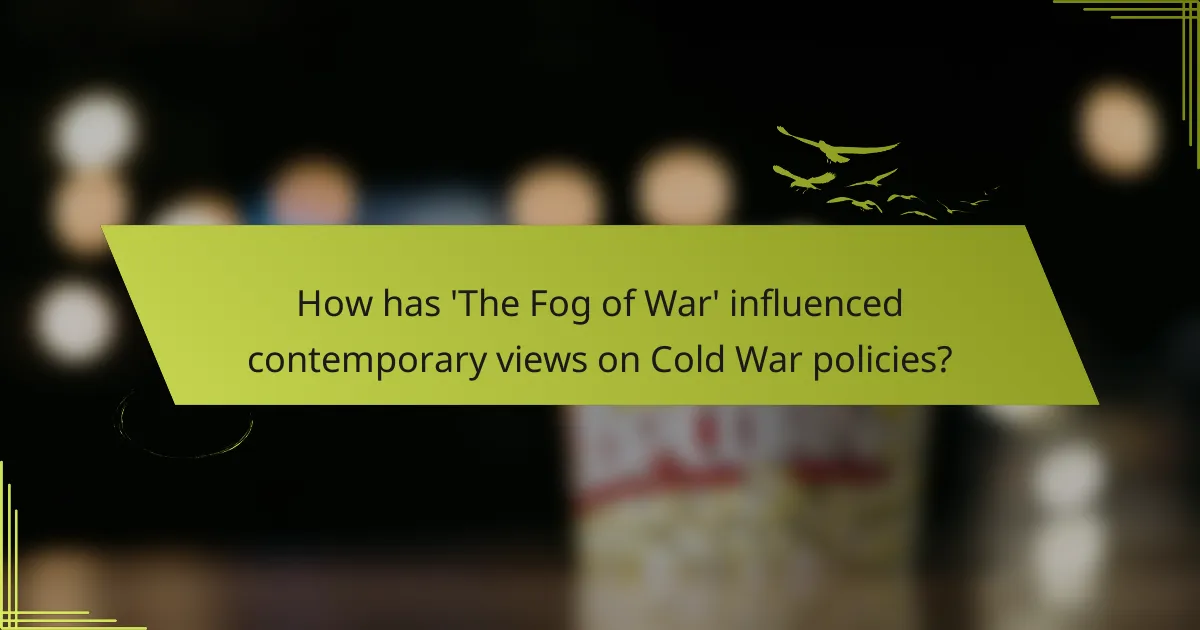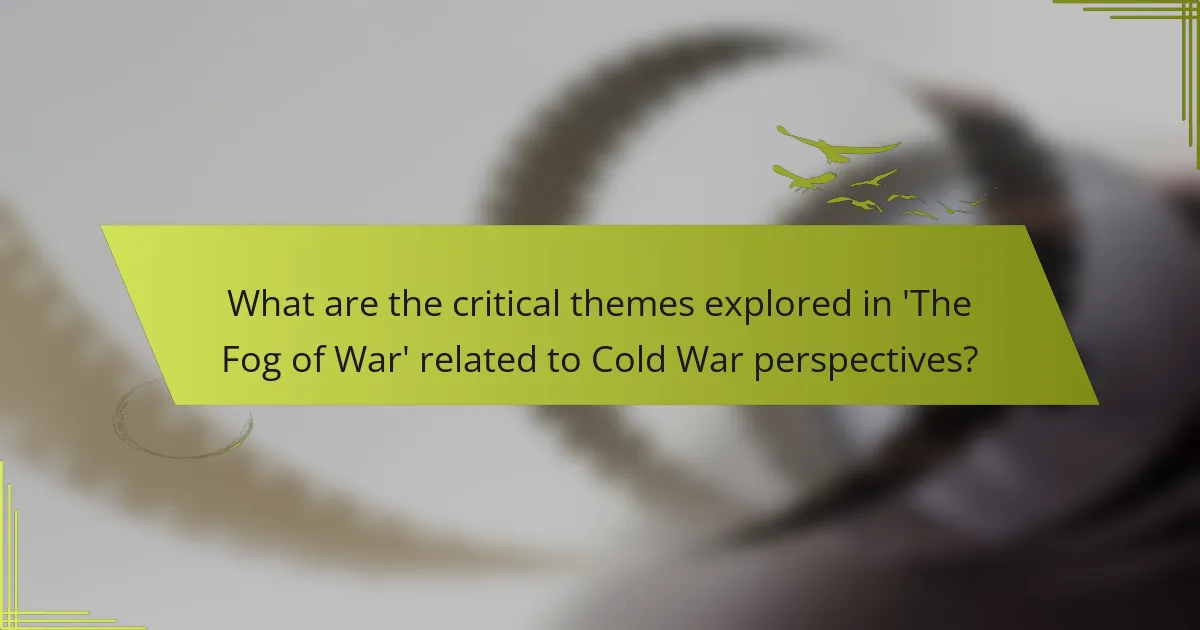
What is ‘The Fog of War’ and its significance in Cold War discourse?
‘The Fog of War’ is a documentary film directed by Errol Morris, featuring former U.S. Secretary of Defense Robert S. McNamara. The film explores the complexities and moral dilemmas of war through McNamara’s experiences during the Vietnam War and the Cold War. Its significance in Cold War discourse lies in its critical examination of decision-making processes and the unpredictability of conflict. The film highlights the lessons learned from historical events, emphasizing the importance of understanding the human cost of war. It encourages reflection on the ethical implications of military strategy and governance during a tense geopolitical period. The insights presented resonate with ongoing discussions about war and peace, making it a pivotal work in analyzing Cold War narratives.
How does ‘The Fog of War’ frame historical events during the Cold War?
‘The Fog of War’ frames historical events during the Cold War by emphasizing the complexities and moral ambiguities of war. The documentary, featuring Robert S. McNamara, presents pivotal moments such as the Cuban Missile Crisis. It highlights the miscommunication and fear that characterized U.S.-Soviet relations. McNamara’s reflections illustrate the consequences of decisions made under pressure. The film argues that understanding these events requires acknowledging the uncertainties involved. It also critiques the notion of clear-cut good versus evil in Cold War narratives. By doing so, it encourages viewers to consider the broader implications of military actions. This perspective reshapes how historical events are interpreted in the context of Cold War dynamics.
What key moments in the Cold War are highlighted in ‘The Fog of War’?
‘The Fog of War’ highlights several key moments in the Cold War. It emphasizes the Cuban Missile Crisis as a pivotal event. This crisis brought the U.S. and the Soviet Union to the brink of nuclear war. The film also discusses the Vietnam War and its implications for U.S. foreign policy. Another significant moment covered is the decision-making processes during these crises. The documentary features Robert S. McNamara’s reflections on the lessons learned. It illustrates the importance of understanding adversaries. The film stresses the need for empathy in international relations. These moments collectively shape a nuanced perspective on Cold War dynamics.
How does the documentary’s narrative style influence perceptions of the Cold War?
The documentary’s narrative style shapes perceptions of the Cold War by emphasizing personal storytelling and emotional resonance. This approach humanizes historical figures, making complex political decisions relatable. For example, Robert S. McNamara’s reflections provide insight into the moral dilemmas faced during the Cold War. The use of archival footage enhances the emotional impact, allowing viewers to connect with the era’s tension. Additionally, the non-linear narrative structure encourages audiences to consider the multifaceted nature of historical events. This style fosters a deeper understanding of the consequences of Cold War policies. By blending personal anecdotes with historical analysis, the documentary challenges simplistic views of the conflict.
Why is Robert S. McNamara’s perspective crucial to understanding ‘The Fog of War’?
Robert S. McNamara’s perspective is crucial for understanding ‘The Fog of War’ because he provides firsthand insights into the complexities of war decision-making. As the U.S. Secretary of Defense during the Vietnam War, McNamara faced significant moral and strategic dilemmas. His reflections illustrate the unpredictability and ambiguity inherent in military strategy. McNamara articulates key themes such as the limitations of knowledge and the consequences of decisions made under pressure. He emphasizes the need for humility in understanding historical events. His experiences highlight the often overlooked human elements of conflict. These insights are essential for grasping the broader implications of Cold War strategies and their lasting impact.
What unique insights does McNamara provide about Cold War strategies?
McNamara provides unique insights into Cold War strategies by emphasizing the importance of rational decision-making. He argues that leaders often relied on flawed assumptions, which led to miscalculations. McNamara highlights the role of nuclear deterrence as a central strategy. He notes that the concept of mutually assured destruction shaped U.S. and Soviet policies. Additionally, he discusses the impact of Vietnam on Cold War strategy. McNamara reflects on the lessons learned from that conflict regarding escalation and intervention. His insights reveal the complexity of geopolitical decision-making during this tense period. These reflections are grounded in his experiences as Secretary of Defense from 1961 to 1968.
How does McNamara’s personal experience shape the documentary’s message?
McNamara’s personal experience significantly shapes the documentary’s message. His role as U.S. Secretary of Defense during the Vietnam War provides a unique perspective. This background allows him to reflect on the complexities of war decisions. The documentary conveys themes of regret and moral ambiguity. McNamara shares personal anecdotes that illustrate the consequences of strategic choices. He emphasizes the importance of empathy in understanding conflict. His experiences underscore the documentary’s critique of militaristic thinking. Overall, his insights contribute to a deeper understanding of Cold War dynamics.

How has ‘The Fog of War’ influenced contemporary views on Cold War policies?
‘The Fog of War’ has significantly influenced contemporary views on Cold War policies by highlighting the complexities and moral ambiguities of warfare. The documentary, featuring former U.S. Secretary of Defense Robert S. McNamara, presents critical reflections on decision-making during the Cold War. It emphasizes the unpredictability of war and the consequences of miscalculations. McNamara’s insights into events like the Cuban Missile Crisis illustrate the dangers of escalation and the importance of communication. This perspective encourages current policymakers to consider historical lessons when addressing modern conflicts. The film fosters a nuanced understanding of Cold War strategies, prompting discussions on diplomacy and conflict resolution. Overall, it shapes a more cautious approach to international relations today.
In what ways has ‘The Fog of War’ contributed to historical scholarship on the Cold War?
‘The Fog of War’ has significantly contributed to historical scholarship on the Cold War by providing unique insights into decision-making processes. The documentary features Robert S. McNamara, a key figure in Cold War policies. His reflections on events like the Cuban Missile Crisis offer a firsthand account of high-stakes decisions. This perspective enriches understanding of Cold War dynamics, particularly the complexities of nuclear strategy. The film emphasizes the importance of empathy and moral considerations in political decisions. It challenges traditional narratives by highlighting the human elements behind policy choices. Scholars have utilized McNamara’s insights to analyze the interplay of fear and rationality during the Cold War. Overall, ‘The Fog of War’ serves as a critical resource for examining the nuances of Cold War history.
What debates have emerged from interpretations of McNamara’s views?
Debates surrounding interpretations of McNamara’s views primarily focus on his reflections on the Vietnam War and nuclear policy. Critics argue that McNamara’s perspective emphasizes rational decision-making while downplaying moral implications. Supporters contend that his insights reveal the complexities of war and the necessity of strategic thinking. The dichotomy of viewing McNamara as a pragmatic leader versus a war architect fuels ongoing discussions. Additionally, interpretations of his statements in “The Fog of War” have sparked debates on accountability and ethical decision-making in government. These discussions highlight differing opinions on the effectiveness and consequences of U.S. foreign policy during the Cold War.
How do historians assess the accuracy of the documentary’s portrayal of events?
Historians assess the accuracy of a documentary’s portrayal of events through critical analysis and comparison with primary sources. They evaluate the documentary’s claims against established historical facts. This includes examining archival materials, interviews, and other documentaries. Historians also consider the context in which the documentary was produced. They analyze the filmmaker’s perspective and potential biases. Peer-reviewed articles and critiques can provide additional insights into the documentary’s reliability. By cross-referencing multiple sources, historians can form a more comprehensive understanding of the events depicted. This method ensures that the portrayal aligns with documented historical evidence.
What lessons from ‘The Fog of War’ remain relevant in today’s geopolitical climate?
The lessons from ‘The Fog of War’ that remain relevant today include the complexity of war and the unpredictability of human behavior. Robert S. McNamara emphasized the importance of understanding the enemy’s perspective. This understanding can prevent miscalculations in modern conflicts. Additionally, the film highlights the necessity of learning from past mistakes. Historical context is crucial in making informed decisions. The concept of “fog” illustrates uncertainty in military operations. This uncertainty is still present in contemporary geopolitical strategies. Finally, the moral implications of decisions made during war are a timeless concern. These lessons serve as a guide for current leaders navigating complex international relations.
How can McNamara’s reflections guide current policymakers?
McNamara’s reflections can guide current policymakers by emphasizing the importance of understanding the complexities of war. He highlighted the need for critical analysis of decisions made during conflicts. Policymakers should consider historical lessons to avoid repeating past mistakes. For instance, McNamara’s acknowledgment of misjudgments during the Vietnam War illustrates the dangers of flawed intelligence. His insights advocate for transparency and open dialogue in decision-making processes. Additionally, he stressed the significance of empathy towards affected populations. This approach can foster more humane and effective policies. Understanding the interconnectedness of global events is crucial for modern governance. Overall, McNamara’s legacy serves as a reminder to prioritize thoughtful deliberation in policymaking.
What parallels can be drawn between the Cold War and modern conflicts?
Parallels between the Cold War and modern conflicts include ideological divides, proxy wars, and nuclear deterrence. The Cold War was characterized by a struggle between capitalism and communism. Modern conflicts often reflect similar ideological battles, such as democracy versus authoritarianism. Proxy wars were prevalent during the Cold War, with nations supporting opposing sides in conflicts like Vietnam and Afghanistan. Today, countries continue to engage in proxy conflicts, such as in Syria and Ukraine. Nuclear deterrence was a key strategy during the Cold War to prevent direct conflict between superpowers. This strategy remains relevant, as nuclear capabilities influence current geopolitical tensions.

What are the critical themes explored in ‘The Fog of War’ related to Cold War perspectives?
‘The Fog of War’ explores critical themes such as the nature of war, the morality of decisions, and the complexities of human conflict. The film presents insights from former Secretary of Defense Robert S. McNamara. It highlights the unpredictability of war and the fog that obscures clarity in decision-making. The theme of miscommunication is significant, showcasing how misunderstandings can escalate tensions. Additionally, it examines the impact of nuclear weapons on global security during the Cold War. The documentary emphasizes the lessons learned from historical events, urging reflection on past mistakes. These themes collectively provide a nuanced perspective on Cold War dynamics and the consequences of military actions.
How does ‘The Fog of War’ address the concept of moral ambiguity in warfare?
‘The Fog of War’ addresses moral ambiguity in warfare by exploring the complexities of decision-making in conflict. The film features Robert S. McNamara, who reflects on his experiences during the Vietnam War. He discusses the ethical dilemmas faced by leaders when making military decisions. McNamara emphasizes that actions taken during war often have unforeseen consequences. He illustrates this through examples of bombings and civilian casualties. The documentary highlights the difficulty in distinguishing right from wrong in wartime scenarios. McNamara’s insights reveal how personal and political motivations can cloud judgment. This narrative underscores the inherent uncertainty in warfare and the moral challenges it presents.
What examples from the documentary illustrate moral dilemmas faced during the Cold War?
The documentary “The Fog of War” illustrates several moral dilemmas faced during the Cold War. One example is Robert S. McNamara’s reflection on the bombing of civilian targets in Vietnam. He grapples with the justifications for these actions and their humanitarian implications. Another example is the Cuban Missile Crisis. McNamara discusses the ethical considerations of nuclear warfare and the potential for global destruction. He emphasizes the importance of communication and understanding between opposing sides. Additionally, McNamara reflects on the morality of decision-making under pressure. He highlights the conflicts between national security and ethical responsibility. These examples underscore the complex moral landscape during the Cold War era.
How does the theme of regret manifest in McNamara’s narrative?
The theme of regret in McNamara’s narrative is evident through his reflections on decisions made during the Vietnam War. He expresses sorrow over the loss of life and the consequences of military strategies. McNamara discusses the failure to foresee the war’s escalation and its impact on both American and Vietnamese citizens. He acknowledges that miscalculations led to unnecessary suffering. His admission of regret is underscored by his belief that more diplomatic solutions could have been pursued. The narrative reveals a deep introspection on the moral implications of his actions. McNamara’s candid acknowledgment of his regrets adds a human dimension to historical events. This theme resonates throughout “The Fog of War,” illustrating the complexities of leadership during turbulent times.
What role does communication play in ‘The Fog of War’ and its Cold War analysis?
Communication is central in ‘The Fog of War’ as it shapes understanding of Cold War dynamics. The documentary emphasizes the importance of dialogue in diplomacy and conflict resolution. Robert S. McNamara reflects on miscommunications that escalated tensions during the Vietnam War. His insights reveal how poor communication can lead to catastrophic decisions. The film illustrates historical events where communication failures resulted in misunderstandings between nations. Specific examples include the Cuban Missile Crisis, where clear communication was vital to avoid nuclear conflict. McNamara’s analysis underscores the need for effective communication in international relations. This focus on communication enhances the viewer’s comprehension of Cold War complexities.
How does the documentary portray the failures and successes of communication during the Cold War?
The documentary portrays the failures and successes of communication during the Cold War by highlighting key historical events and decisions. It emphasizes the miscommunication that led to crises, such as the Cuban Missile Crisis in 1962. This event showcased how misunderstandings between leaders escalated tensions. The documentary also illustrates successful communication instances, like the establishment of the Hotline Agreement in 1963. This direct line between the U.S. and Soviet leaders aimed to prevent nuclear war. Furthermore, it discusses the impact of propaganda and media on public perception. The documentary uses interviews with key figures, including Robert S. McNamara, to provide insights into decision-making processes. These narratives reveal the complex interplay of communication that shaped Cold War dynamics.
What impact did communication strategies have on Cold War outcomes as depicted in the film?
Communication strategies significantly influenced Cold War outcomes as depicted in the film. The film illustrates how effective communication helped de-escalate tensions during critical moments. For instance, the Cuban Missile Crisis showcased the importance of direct communication between leaders. The use of back-channel negotiations prevented potential military conflict. Additionally, the film highlights the role of propaganda in shaping public perception. Strategic messaging influenced both domestic and international opinions on the Cold War. Overall, the film emphasizes that communication was a key factor in navigating the complexities of Cold War politics.
What practical insights can be drawn from ‘The Fog of War’ for understanding conflict resolution?
‘The Fog of War’ provides insights into conflict resolution by emphasizing the complexity of human decision-making. It illustrates how miscommunication can escalate tensions. The documentary highlights the importance of empathy in understanding opposing viewpoints. Historical examples, such as the Cuban Missile Crisis, show the need for careful negotiation. The film underscores the impact of unintended consequences in military actions. It also stresses the value of learning from past mistakes to prevent future conflicts. These lessons encourage a more nuanced approach to conflict resolution.
How can the lessons from McNamara’s experiences apply to current international relations?
Lessons from McNamara’s experiences emphasize the importance of clear communication and understanding in international relations. His tenure during the Vietnam War highlighted the consequences of misjudgment and lack of transparency. Effective decision-making requires accurate information and consideration of diverse perspectives. In current international relations, similar missteps can lead to escalated conflicts. The Cuban Missile Crisis serves as an example of the need for diplomacy and negotiation. McNamara’s advocacy for rational analysis can guide modern leaders in assessing risks. His experiences remind us that emotional responses can cloud judgment, which is critical in today’s geopolitical climate. Emphasizing collaboration and dialogue can prevent misunderstandings and foster peace.
What strategies for effective diplomacy can be learned from the Cold War era as presented in ‘The Fog of War’?
Effective diplomacy strategies from the Cold War era in ‘The Fog of War’ include understanding the complexities of human nature and the importance of empathy. The film emphasizes the necessity of recognizing the motivations and fears of adversaries. This understanding can prevent misunderstandings and escalation of conflicts. Additionally, the film illustrates the significance of communication in diplomacy. Clear, honest dialogue can help to bridge gaps between opposing sides. Historical examples in the film, such as the Cuban Missile Crisis, highlight the need for careful negotiation and the avoidance of rash decisions. The film also stresses the value of learning from past mistakes to inform future diplomatic efforts.
The main entity of this article is ‘The Fog of War,’ a documentary directed by Errol Morris that features Robert S. McNamara, former U.S. Secretary of Defense. The article examines the significance of the film in analyzing Cold War discourse, focusing on its exploration of decision-making complexities and moral dilemmas during pivotal events such as the Cuban Missile Crisis and the Vietnam War. It highlights McNamara’s unique insights into the unpredictability of war, the importance of communication, and the ethical implications of military strategies. Additionally, the article discusses how the documentary has influenced contemporary views on Cold War policies and contributed to historical scholarship, emphasizing lessons relevant to modern international relations and conflict resolution.